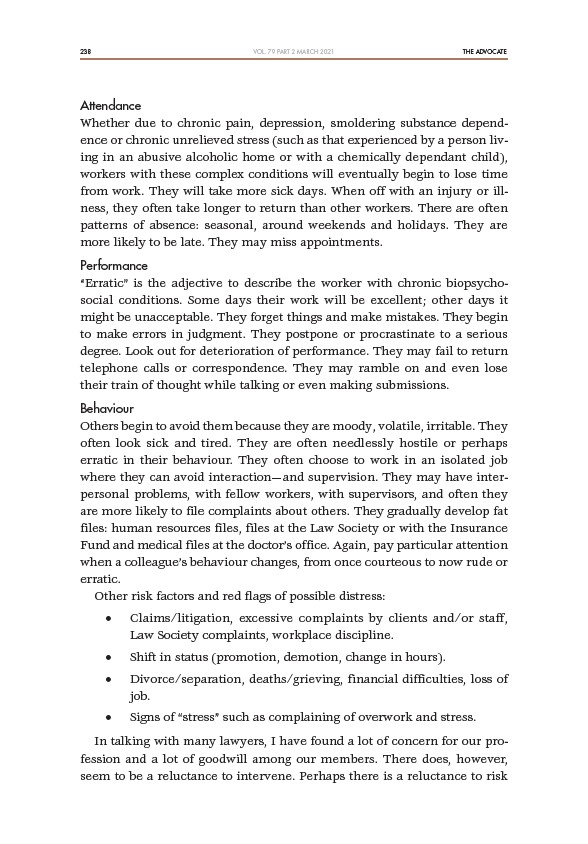
238 THE ADVOCATE
VOL. 79 PART 2 MARCH 2021
Attendance
Whether due to chronic pain, depression, smoldering substance dependence
or chronic unrelieved stress (such as that experienced by a person living
in an abusive alcoholic home or with a chemically dependant child),
workers with these complex conditions will eventually begin to lose time
from work. They will take more sick days. When off with an injury or illness,
they often take longer to return than other workers. There are often
patterns of absence: seasonal, around weekends and holidays. They are
more likely to be late. They may miss appointments.
Performance
“Erratic” is the adjective to describe the worker with chronic biopsychosocial
conditions. Some days their work will be excellent; other days it
might be unacceptable. They forget things and make mistakes. They begin
to make errors in judgment. They postpone or procrastinate to a serious
degree. Look out for deterioration of performance. They may fail to return
telephone calls or correspondence. They may ramble on and even lose
their train of thought while talking or even making submissions.
Behaviour
Others begin to avoid them because they are moody, volatile, irritable. They
often look sick and tired. They are often needlessly hostile or perhaps
erratic in their behaviour. They often choose to work in an isolated job
where they can avoid interaction—and supervision. They may have interpersonal
problems, with fellow workers, with supervisors, and often they
are more likely to file complaints about others. They gradually develop fat
files: human resources files, files at the Law Society or with the Insurance
Fund and medical files at the doctor’s office. Again, pay particular attention
when a colleague’s behaviour changes, from once courteous to now rude or
erratic.
Other risk factors and red flags of possible distress:
• Claims/litigation, excessive complaints by clients and/or staff,
Law Society complaints, workplace discipline.
• Shift in status (promotion, demotion, change in hours).
• Divorce/separation, deaths/grieving, financial difficulties, loss of
job.
• Signs of “stress” such as complaining of overwork and stress.
In talking with many lawyers, I have found a lot of concern for our profession
and a lot of goodwill among our members. There does, however,
seem to be a reluctance to intervene. Perhaps there is a reluctance to risk